Cellular self-eating modulates immunity and the elimination of pathogens via autophagy. The body recognizes damaged cells and recycles them. Autophagy gets triggered in response to stress like infections, starvation, high exertion or certain compounds such as various phytochemicals. You can promote autophagy with positive stressors such as intermittent fasting, caloric restriction, regular sauna, exercise and cold exposure.
Introduction
When there is no food available, a cell is forced to break down parts of its reserves to stay alive until the circumstances change. This natural biological process is called autophagy. Even on a day-to-day basis, autophagy is activated between meals to maintain metabolic functions and to supply amino acids and energy via catabolism. Autophagy (autophagocytosis) is a carefully regulated mechanism of “self-eating” that cells perform to destroy viral particles (virophagy) and to degrade some of their components including proteins, organelles and foreign particles (xenophagy). Autophagy is essential for life because it cleans the cells from unnecessary and dysfunctional components and recycles them for further use in the body.
Autophagy encompasses three main types: microautophagy, chaperone-mediated autophagy (CMA) and macroautophagy. All of these are important and they work in cooperation inside the cells. Autophagy as a process is very strictly regulated and the whole machinery consists of at least 30 different genes.
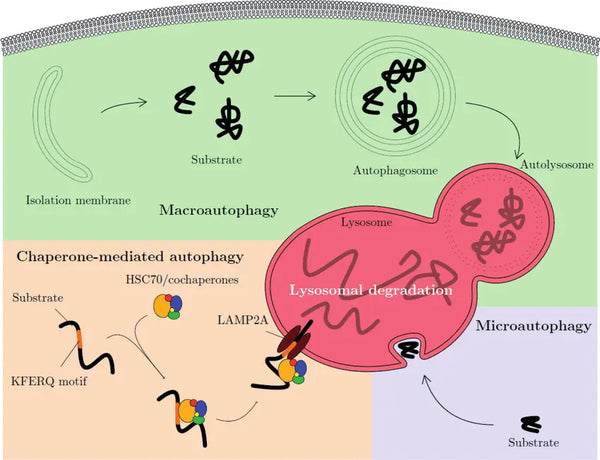
Image: Schematic model of the three main types of autophagy.
Source: Ntsapi, C. & Du Toit, A. & Loos, B. (2019). Dietary impact on neuronal autophagy control and brain health. In: Bosch-Bouju, C. & Layé, S. & Pallet, V. (2019). Feed Your Mind -. How Does Nutrition Modulate Brain Function throughout Life? IntechOpen.
Autophagy is crucial also for brain plasticity and neuroprotection. Pathways between neurons and glial cells are thought to regulate autophagy in the brain. Different pathways shuttle cellular garbage from neurons to glial cells to maintain homeostasis in the brain. In practice, this means that the brain thrives with adequate autophagy processes throughout life.
The central nervous system (CNS; including the brain) accommodates a diverse myeloid immune cell compartment that maintains its homeostasis. Autophagy and autophagy proteins play fundamental roles in myeloid cell-related immune functions. Activating autophagy constantly can also improve and even reverse age-related decline in cognitive functions such as memory loss.
The autophagy machinery supports primarily three aspects of myeloid cell immunobiology, thereby affecting the main components of the CNS immune system. These are clearance of pathogens in a cell-intrinsic manner, regulating proinflammatory cytokine production, and antigen processing for adaptive immune system stimulation. Myeloid cells include granulocytes and monocytes.
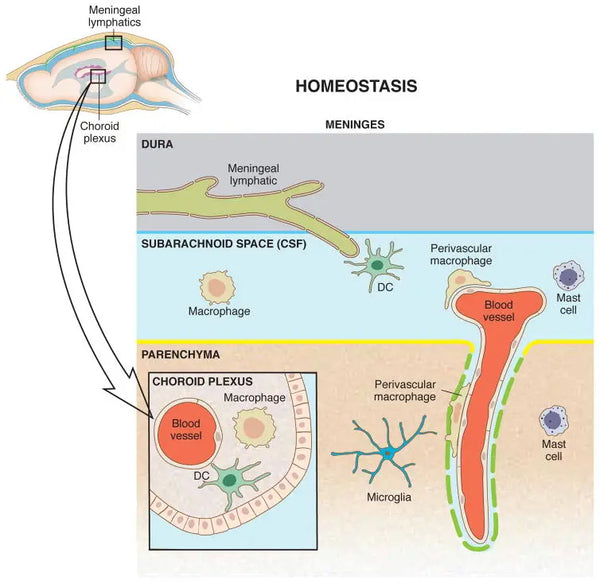 Image: Myeloid cells in the central nervous system.
Image: Myeloid cells in the central nervous system.
Source: Herz, J. & Filiano, A. & Smith, A. & Yogev, N. & Kipnis, J. (2017). Myeloid cells in the central nervous system. Immunity 46 (6): 943–956.
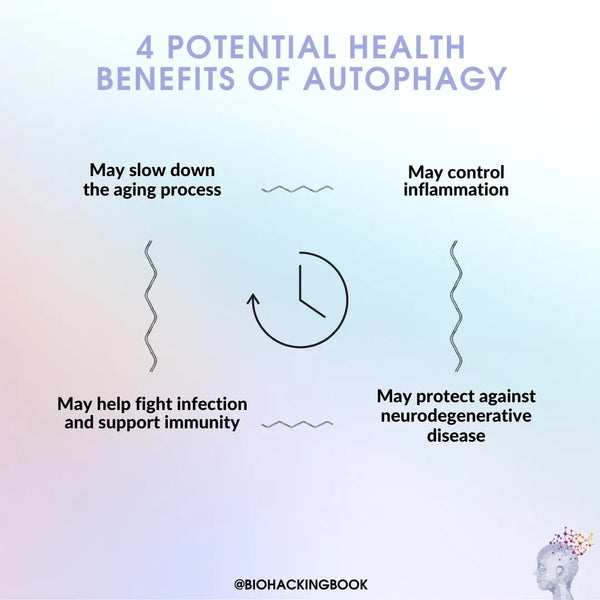
Health benefits of balanced autophagy are for example:
- May protect from obesity and diabetes
- Autophagy may be involved in the browning of white adipose tissue and affect the metabolic balance of lipids
- Autophagy helps also prevent NAFLD (non-alcoholic fatty liver disease)
- Better cardiovascular function and protection from cardiovascular diseases
- Impaired autophagy can increase arterial aging
- Protection from oxidative stress and inflammation
- Autophagy tempers inflammation by eliminating active inflammasomes
- Elevated liver protection from various liver conditions and diseases
- Improved function of the immune system
- Innate immune receptors and lymphocytes (T and B) are modulated by autophagy, which represents innate and adaptive immune responses
- Better gastrointestinal function, overall gut health and disease prevention
- Autophagy is likely to play a key role in the process of gastrointestinal homeostasis, serving to remove bacteria that make it into tissues and degrade any non-self immunostimulatory molecules to maintain intestinal tolerance.
- Slows down aging and neurodegeneration and may prevent from neurodegenerative diseases
- May prevent from certain types of cancers – however, tumor cell-intrinsic effects of autophagy can be both tumor suppressive and tumor promotional
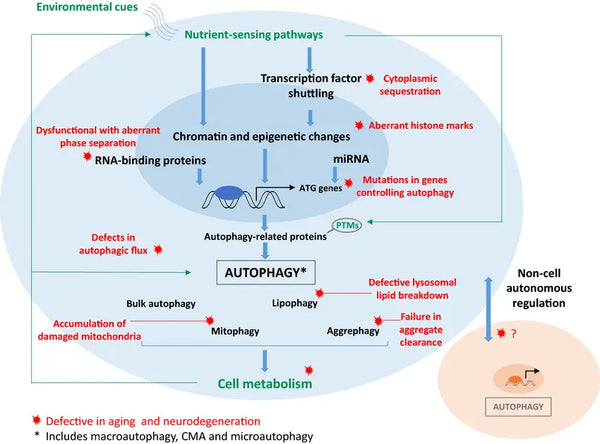
Image: Interplay between autophagy, metabolism and aging.
Source: Wong, S. & Kumar, A. & Mills, J. & Lapierre, L. (2020). Autophagy in aging and longevity. Human Genetics 139 (3): 277–290.
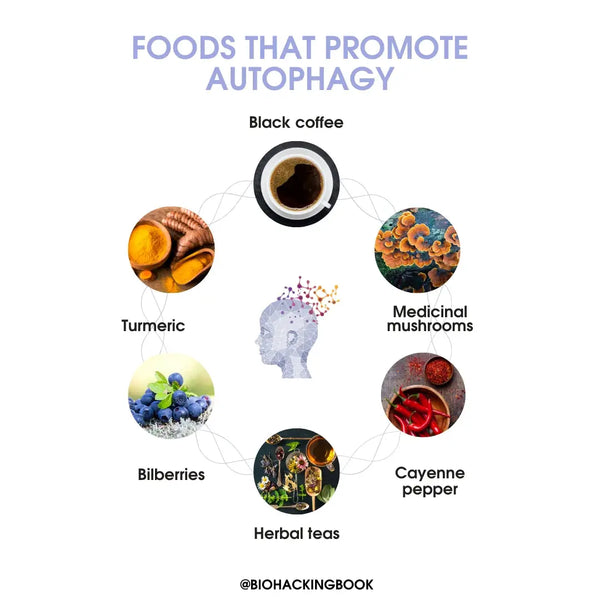
Nutritional factors supporting autophagy
- Sulforaphane in cruciferous vegetables and broccoli sprouts, in particular.
- Induces autophagy through ERK activation in neurons (independent of Nrf2 activity)
- Also inhibits blue light-induced inflammation and apoptosis by upregulating the SIRT1/PGC-1α/Nrf2 pathway (see earlier) and autophagy in retinal pigment epithelial cells – this means that via retinal autophagy, sulforaphane protects the eyes
- Curcumin induces and modulates autophagy and is hence neuroprotective
- It may protect cells against oxidative stress‑induced damage by inhibiting apoptosis and inducing autophagy via the Akt/mTOR pathway.
- Coffee (both normal and decaffeinated) induces autophagy most likely because of its high polyphenol count
- Green tea and its main polyphenol epigallocatechin-3-gallate (EGCG) stimulates autophagy in the liver and in the brain
- Ginger and one of its bioactive compounds, 6-shogaol, induces autophagy by inhibiting the AKT/mTOR pathway
- Polyphenols regulate and induce autophagy and remove aberrant protein aggregates (an important factor in treating neurodegeneration).
- Polyphenols are found in dark and colorful vegetables, berries, dark leafy greens, coffee and green tea (see before).
- Polyphenols play an important role in the modulation of autophagy-induced death of cancer cells.
- Resveratrol is a naturally occurring antioxidant found in dark grapes, berries, cherries, and red wine.
- Multiple studies show that it induces autophagy by directly inhibiting mTOR (and that’s why it is not recommended to take after exercise).
- The induction of autophagy in the brain by resveratrol can prevent neurodegenerative diseases.
- Resveratrol targets multiple inflammatory components and exerts immune-regulatory effects on immune cells.
- Extra virgin olive oil (EVOO) contains oleuropein and oleocanthal, polyphenols that trigger autophagy and inhibit mTOR signaling
- Medicinal mushrooms like Reishi and Chaga induce autophagy and can fight cancer
- Chaga mushroom extract induced autophagy by activating AMPK and inhibiting the mTOR signaling pathway in breast cancer cells
- Triterpenes from Ganoderma Lucidum induce autophagy in colon cancer through the inhibition of p38 mitogen-activated kinase (p38 MAPK)
- Ganoderma lucidum extract (GLE) ameliorates parkinsonism pathology via regulating mitochondrial function, autophagy, and apoptosis.
- Long-chain omega-3 fatty acids (PUFA) found in salmon, sardines, cod, herring, mackerel and algae induce autophagy.
- Long-chain omega-3 supplementation attenuates traumatic brain injury-induced neuronal apoptosis by inducing the autophagy pathway via SIRT1
- Long-chain omega-3 fatty acids exert protective effects on hepatocytes against lipotoxicity through induction of autophagy
- Omega-3 fats from fish have been shown to protect the retina by inducing autophagy
- Spermidine increases autophagy in the brain and can protect from neurodegeneration
- Spermidine-rich food items comprise unprocessed plant-derived foods including the durian fruit, shiitake mushroom, fresh green pepper, wheat germ, amaranth grain, cauliflower and broccoli and also products resulting from fermentation processes that involve polyamine-generating bacteria and fungi, e.g. soybean products such as natto and many types of mature cheese
- Based on studies done on flies, spermidine ameliorates memory during aging via autophagy
- Spermidine’s potency has been recently quantified to be equivalent to that of rapamycin (the golden standard on autophagy)
- The optimal concentration of spermidine in humans to maintain optimal autophagy levels for healthy aging still needs further investigation.
See a specific recipe on Autophagy Activator here.
Read more about the benefits of cold exposure and heat alteration on autophagy here and here.
///
Did you know that Spermidine has been proven to support autophagy and promotes cellular renewal? They usually sell pretty fast, so make sure you grab yours here:
https://shop.biohackercenter.com/products/primeadine?_pos=1&_sid=cac2a9e22&_ss=r
This article was an excerpt from our big and mighty forthcoming the Resilient Being Book.





